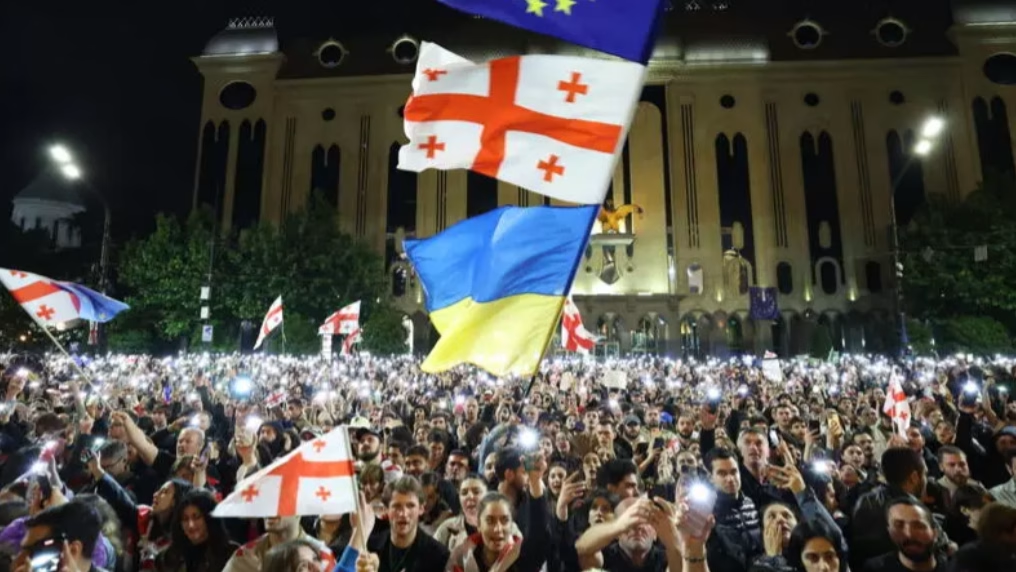Georgia has enacted a controversial law, seen by the EU as anti-LGBTQ, which has drawn comparisons to repressive legislation in Russia. This move by the ruling Georgian Dream party comes as the country approaches parliamentary elections later this month.
Parliament Speaker Shalva Papuashvili announced on Facebook that he had signed the so-called “family values” bill into law, despite a previous refusal from pro-Western President Salome Zurabishvili to endorse it. Zurabishvili criticized the legislation, stating it contradicts the spirit of European recommendations necessary for initiating membership discussions with the EU.
The president, who has had ongoing conflicts with the government, emphasized that the bill is part of a series of anti-democratic measures that opposition parties have pledged to repeal if they gain power in the upcoming elections on October 26.
The new law mirrors Russia’s “gay propaganda” legislation, raising concerns that Georgia is aligning itself more closely with Moscow since its invasion of Ukraine. It prohibits the promotion of same-sex relationships and incest in educational settings and on television.
Critics have condemned the law’s language for equating homosexual relationships with incest, arguing that it perpetuates harmful stereotypes. Additionally, the legislation restricts gender transition and adoption rights for gay and transgender individuals and invalidates same-sex marriages conducted abroad.
The Georgian Dream party pushed a controversial bill through parliament last month in a vote that was boycotted by the opposition, escalating tensions ahead of the upcoming parliamentary elections. The party, controlled by billionaire Bidzina Ivanishvili, is aiming for a super-majority that would enable it to constitutionally ban pro-Western opposition parties.
Parliament Speaker Shalva Papuashvili defended the legislation against allegations that it contradicts European values. He claimed the measures are grounded in “common sense, historical experience, and centuries-old Christian, Georgian, and European values,” rather than in “changeable ideas and ideologies.” He emphasized that the law aims to protect the rights of all citizens.
However, human rights organizations and Western nations have criticized the law, labeling it discriminatory and warning that it fosters a hostile environment for LGBTQ individuals.
Tragically, the context of this legislation has been marred by violence; last month, a prominent transgender woman in Georgia was stabbed to death in her apartment just a day after the parliament approved the bill.
Tbilisi’s relationship with Brussels has soured in recent years, even as the EU granted Georgia official “candidate status” in 2023. Earlier this year, the Black Sea nation enacted an anti-NGO “foreign influence” law, which sparked weeks of mass protests against the government and drew strong condemnation from the West.
Brussels has issued repeated warnings that such measures signal Georgia’s departure from its declared goal of EU membership. Last month, the European Union criticized a new LGBTQ bill, stating it “undermines fundamental rights” and could lead to increased stigmatization and discrimination against certain groups within the population. The EU cautioned that this law could have significant repercussions for Tbilisi’s European integration efforts and further strain relations between the two.
The United States has also expressed concerns, with Secretary of State Antony Blinken announcing visa restrictions on 60 Georgians, including high-ranking government officials, whom he accused of “undermining democracy” in the country. “We remain concerned about human rights abuses and anti-democratic actions in Georgia, and we will continue to consider additional actions in response,” Blinken stated.
In a reaction to potential sanctions from Washington, Georgia’s Prime Minister, Irakli Kobakhidze, threatened that the country could “revise” its ties with the U.S.
Initially, when the Georgian Dream party came to power in 2012, it pursued a liberal, pro-Western policy agenda. However, in the last two years, it has increasingly adopted anti-Western and anti-liberal positions.

